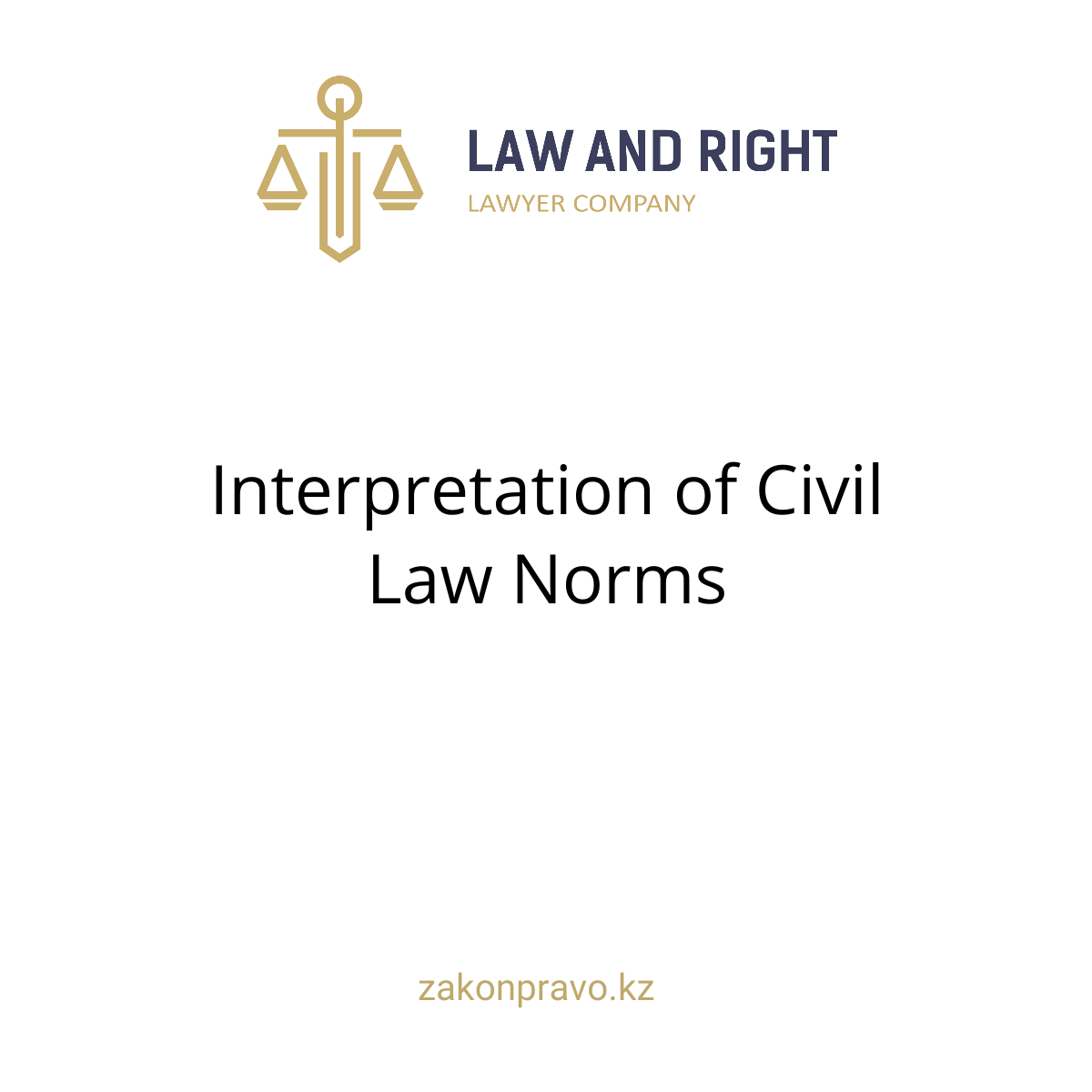Interpretation of Civil Law Norms
🔹 GENERAL CHARACTERISTICS OF ARTICLE 6 OF THE CIVIL CODE OF THE REPUBLIC OF KAZAKHSTAN (CC RK)
Article 6 of the Civil Code of the Republic of Kazakhstan establishes the principles for interpreting norms of civil legislation based on:
· literal interpretation (paragraph 1),· systemic and historical approach, as well as consideration of judicial practice (paragraph 2).
This rule is aimed at:
· ensuring legal certainty,· uniform application of legal norms,· and upholding the principle of the rule of law.
🔹 I. LITERAL INTERPRETATION (Paragraph 1 of Article 6)
✅ Essence
Priority is given to the lexical meaning of words – i.e., how they are commonly used in legal and everyday language.
📌 Key formulation:
“Norms... shall be interpreted in accordance with the literal meaning of their verbal expression.”
⚖️ Judicial Practice:
Resolution No. 4 of the Supreme Court of the Republic of Kazakhstan (2003) “On the Court Decision” states: if the meaning of the norm is clear, the court is not entitled to attribute a different meaning to it, even if another interpretation appears more reasonable.
🔹 II. PRIORITY OF CONSTITUTIONAL AND FUNDAMENTAL APPROACHES
If the literal meaning allows for multiple interpretations, preference shall be given to:
1. Compliance with the Constitution of the Republic of Kazakhstan (Articles 4 and 8);2. The fundamental principles of civil legislation outlined in Article 2 of the CC RK, namely:o equality of participants,o inadmissibility of arbitrary interference,o freedom of contract,o good faith,o priority of restoration of violated rights.
🔍 Example:
If the term “property” in a certain provision can be interpreted either as movable property or as any economic value – preference is given to the broader interpretation if it ensures the protection of property rights (e.g., in bankruptcy cases).
🔹 III. HISTORICAL AND SYSTEMIC INTERPRETATION (Paragraph 2 of Article 6)
✅ Essence
· It is necessary to consider the purpose, context, and conditions under which the norm was adopted;· Judicial practice may be taken into account, provided it does not contradict the literal meaning.
📌 Historical Interpretation:
Allows for consideration of the legislative intent and reasons for the adoption of the norm (e.g., reforms of 1999 or 2011, reforms in digital and contract law in Kazakhstan).
📌 Judicial Interpretation:
The Supreme Court and lower courts form established approaches that may be used for understanding ambiguous norms – but only within the limits of their literal meaning.
🔹 IV. TYPES OF INTERPRETATION IN PRACTICE (CLASSIFICATION)
| Type of Interpretation | Description | Example |
|---|---|---|
| Literal (grammatical) | Based on dictionary meaning | Definition of “lease” as temporary transfer of property |
| Systemic | In connection with other norms | Understanding Article 145 CC RK in conjunction with Article 188 |
| Historical | Based on the purpose of the norm | Development of the concept of “obligation” in the context of market reforms |
| Functional | Based on the goal and purpose of application | Enforcement of pledge during bankruptcy |
| Judicial | Based on legal positions of the Supreme Court | Clarifications in normative resolutions |
🔹 V. RELATED NORMS IN THE LEGISLATION OF THE RK
| Code / Law | Provision | Connection |
|---|---|---|
| Constitution of the Republic of Kazakhstan | Articles 4, 8, 12, 13 | Rule of law, protection of rights |
| Civil Procedure Code (CPC) of the RK | Article 6 | The court may not refuse to consider a case due to a legal gap |
| Law of the RK “On Normative Legal Acts” | Articles 40–41 | Rules for official and authentic interpretation |
| Civil Code of the RK | Articles 2, 5, 7 | Principles, analogy, customs |
🔹 VI. INTERNATIONAL STANDARDS AND COMPARATIVE LEGAL ANALYSIS
| International Instrument | Content | Applicability |
|---|---|---|
| UNIDROIT Principles (2016) | Art. 4.1 – interpretation according to ordinary meaning and purpose | Corresponds to paragraphs 1 and 2 of Article 6 of the CC RK |
| Vienna Convention on the Law of Treaties (1969) | Art. 31 – interpretation in good faith and in context | Universal approach, applicable to private law relations |
| Practice of the European Court of Human Rights | Laws and rights must be foreseeable and understandable | Principle of legal certainty |
🔸 Example 1:
In storage contract disputes, courts apply literal interpretation: the obligation to store does not include an obligation to insure unless expressly stated.
🔸 Example 2:
In a 2021 Supreme Court review, it was explained that when determining the moment of ownership transfer under a pledge agreement, courts should consider the goal of contract law reform (historical approach), not just the literal meaning.
🔹 VIII. SIGNIFICANCE OF ARTICLE 6 FOR LEGAL PRACTITIONERS
For judges, lawyers, and notaries, Article 6 of the CC RK serves as:
· a guideline for resolving issues of interpretation,· a limit to judicial discretion, preventing arbitrary or creative reinterpretation of the law,· a tool for aligning civil law norms with constitutional values and legal principles.
🔹 CONCLUSION
Article 6 of the Civil Code of the Republic of Kazakhstan is the foundation of legal hermeneutics in civil law. It:
· ensures predictability of legal consequences,
· promotes uniformity in judicial practice,
· strengthens public and business trust in the legal system.
Attention!
Law and Law Law Law draws your attention to the fact that this document is basic and does not always meet the requirements of a particular situation. Our lawyers are ready to assist you in legal advice, drawing up any legal document suitable for your situation.
For more information, please contact a Lawyer / Attorney by phone: +7 (708) 971-78-58; +7 (700) 978 5755, +7 (700) 978 5085.
Attorney at Law Almaty Lawyer Legal Services Legal Advice Civil Criminal Administrative Cases Disputes Protection Arbitration Law Firm Kazakhstan Law Office Court Cases


